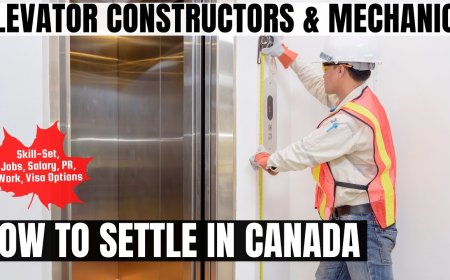Carpenters Migration to Canada: A Detailed Guide on Salaries, Professional Responsibilities, and Preferred Locations
Welcome to the pathway to Canada immigration for skilled professionals and trade workers. This guide is specifically tailored for Carpenters looking to work and settle in Canada, offering a deep dive into the essential aspects of immigration and employment in this field.
Introduction
Carpentry is a skilled trade that plays a crucial role in the construction industry, and Canada is always in need of skilled carpenters to meet the growing demand for new infrastructure and residential developments. In this article, we will explore the profile of Carpenters under the National Occupation Classification code NOC 7271, including their main job duties, education and licence requirements, skills necessary for success in this field, median salary, and possible visa options for international carpenters looking to immigrate to Canada. If you are considering a career in carpentry or are a carpenter looking to make the move to Canada, this article will provide you with valuable information to help you make informed decisions.
What is the Profile Description of a Carpenters as per the Canadian National Occupation Classification (NOC) Standards?
Carpenters are skilled professionals who specialize in constructing, erecting, installing, maintaining, and repairing various structures and components made of wood, wood substitutes, lightweight steel, and other materials. They are typically employed by construction companies, carpentry contractors, or maintenance departments of factories, plants, and other establishments. Additionally, some carpenters choose to work as self-employed individuals. Their expertise and craftsmanship play a vital role in creating and maintaining a wide range of structures, from residential homes to commercial buildings.
What are the Main Job Duties of a Carpenters in Canada?
- Read and interpret blueprints, drawings, and sketches to determine specifications and calculate requirements
- Prepare layouts in conformance to building codes, using measuring tools
- Measure, cut, shape, assemble, and join materials made of wood, wood substitutes, lightweight steel, and other materials
- Build foundations, install floor beams, lay subflooring, and erect walls and roof systems
- Fit and install trim items, such as doors, stairs, moulding, and hardware; maintain, repair, and renovate residences and wooden structures in mills, mines, hospitals, industrial plants, and other establishments; supervise apprentices and other construction workers; and prepare cost estimates for clients
What are the Education, Certifications, and Licensing Requirements to Work as Carpenters in Canada?
To become a Carpenter, individuals typically need to have completed high school. They must also have completed a three to four-year apprenticeship program, or have a combination of four years of work experience in the trade along with some carpentry courses. Trade certification is mandatory in Quebec and optional in other provinces and territories, while in Saskatchewan, trade certification for framers is voluntary. Qualified Carpenters can also obtain a Red Seal endorsement by successfully completing the interprovincial Red Seal examination.
What Essential Skills are Required for Carpenters to succeed in Canada?
To be successful in the profession of carpentry, individuals must have essential skills such as the ability to read and interpret blueprints, drawings, and sketches to determine specifications and calculate requirements. They should be able to prepare layouts in conformance to building codes using measuring tools, as well as measure, cut, shape, assemble, and join materials made of wood, wood substitutes, lightweight steel, and other materials. Carpenters should also be skilled in building foundations, installing floor beams, laying subflooring, and erecting walls and roof systems, as well as fitting and installing windows, doors, stairs, mouldings, and hardware. Additionally, they must have the skills to maintain, repair, and renovate residences and wooden structures in various establishments such as mills, mines, hospitals, and industrial plants.
What is the Median Age and Retirement Age for Carpenters in Canada?
Skilled professionals working as Carpenters typically have a median age of 39.0 years old, indicating that there is a mix of younger and older individuals within the profession. The average retirement age for Carpenters is 64.0, suggesting that many individuals in this field continue to work well into their later years. This may be due to a combination of factors such as a passion for their craft, the physical nature of the work keeping them active, and the opportunity to mentor and pass on their knowledge to the next generation of Carpenters. Overall, the skilled professionals in this occupation demonstrate a dedication to their careers and a commitment to their craft.
How many job openings exist for Other Carpenters in Canada, and what's their provincial distribution?
There are a total of 1230 job openings for the profile of Carpenters in Canada. The province with the highest number of job openings is British Columbia with 631 opportunities, followed by Ontario with 260 job openings. Québec has 115 job openings, Alberta has 98, and Saskatchewan has 46. The provinces with the lowest number of job openings for Carpenters are Northwest Territories and Yukon, each with only 1 opening. The job market for Carpenters seems to be thriving in provinces like British Columbia, Ontario, and Québec, while it is more limited in the territories and smaller provinces. With such a high demand for Carpenters across the country, individuals interested in pursuing a career in this field have plenty of opportunities to explore.
What is the hourly wage or salary of Carpenters in different Provinces of Canada?
The wage analysis for Carpenters in Canada shows a significant variation in earnings based on the province in which they work. In Nunavut, Carpenters have a high wage of $35.00, a median wage of $27.54, and a low wage of $20.89. Moving to the Northwest Territories, Carpenters see a high wage of $38.25, a median wage of $28.00, and a low wage of $20.90. In the Yukon Territory, the high wage is $36.00, the median wage is $28.77, and the low wage is $21.50. Carpenters in Quebec have the highest wages overall, with a high wage of $39.10, a median wage of $30.00, and a low wage of $18.00. Conversely, Carpenters in Prince Edward Island have the lowest wages, with a high wage of $24.00, a median wage of $19.00, and a low wage of $15.00. Overall, Carpenters in Canada can expect to earn between $14.00 and $39.10 per hour, depending on the province in which they work.
What are the various visa options available for Carpenters migrating to Canada?
Carpenters have great opportunities for migration to Canada as their profile is currently in high demand. They are eligible for Category based Express Entry Invitation draws for Canadian PR under the Trade Occupations Category. The Express Entry Visa Category is a point-based system that considers factors like age, education, work experience, and language proficiency. Additionally, Carpenters can also explore Provincial Nominee Programs, which allow provinces to nominate individuals for PR based on their skills and work experience. Employer Sponsored Work Visas are another option for Carpenters to consider, where a Canadian employer can sponsor their work permit. Besides these options, there may be other visa programs available for Carpenters interested in migrating to Canada. To know more and discuss all the details, you can book an appointment with our professionals for personalized guidance and assistance in your migration journey.
Have Questions or Need Assistance?
If you have any queries or require assistance with your immigration plans, we're here to help. Our experienced immigration consultants are ready to provide personalized guidance tailored to your specific needs.
Don't hesitate to reach out and schedule an appointment today. Whether you're seeking clarification on immigration processes, exploring visa options, or need support with documentation, we're dedicated to assisting you every step of the way.
Book an appointment with our team to discuss your immigration goals and receive expert guidance for your journey to Canada.
What's Your Reaction?
 Like
0
Like
0
 Dislike
0
Dislike
0
 Love
0
Love
0
 Funny
0
Funny
0
 Angry
0
Angry
0
 Sad
0
Sad
0
 Wow
0
Wow
0




































































